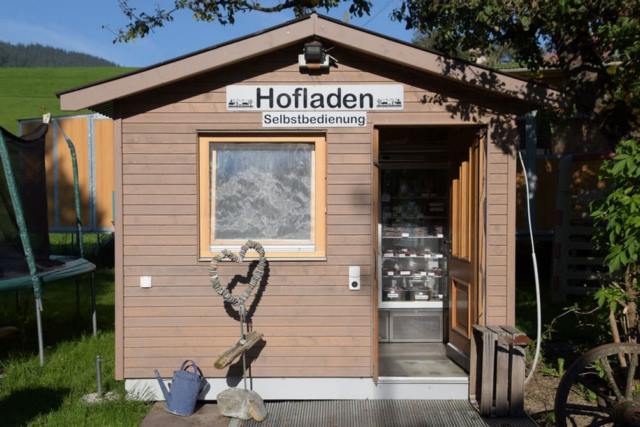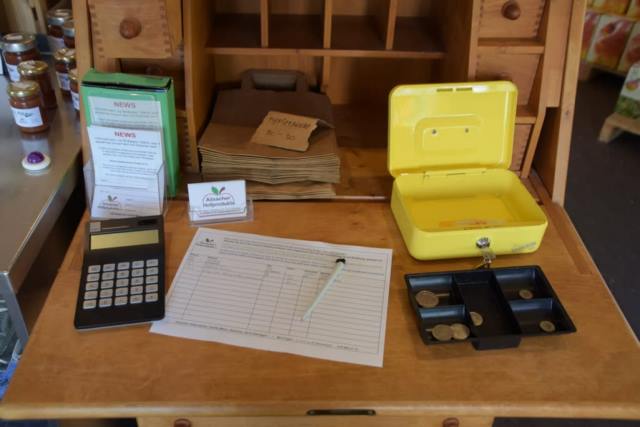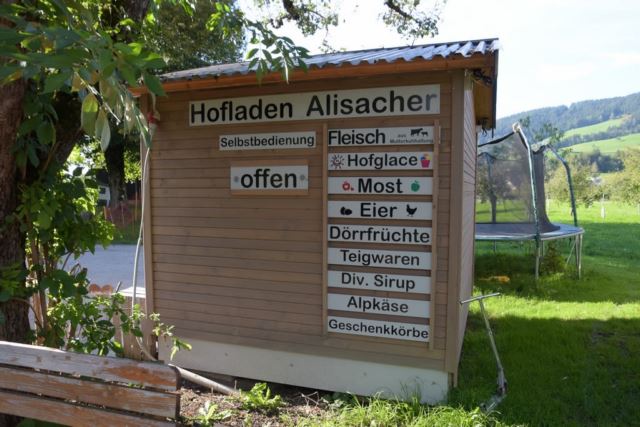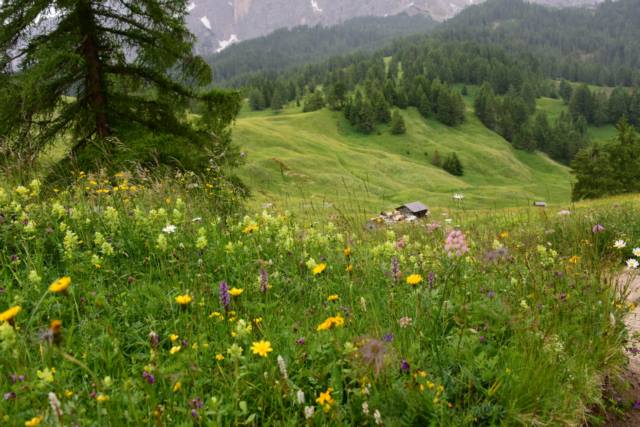Tue, Nov 2nd 2021

The ‘Hofladen’ is how the Swiss shop ‘direct from farm’. Open 24/7 and unmanned, the self-serve Hofladen features organic meat, raw-milk cheeses, hand made pasta, fresh pressed juices, and local wine and spirits.
While a focus on locally grown produce and farm-to-table culinary experiences has become a trendy topic, the tradition of “shopping local” has been a long pervasive aspect of Swiss culture. The Swiss have been stocking their shelves with the products grown and produced on local farms for centuries. And despite the arrival of large convenient chain stores, the Swiss still enjoy the interaction and experience of purchasing from smaller, local farm shops and vendors.
The concept of local Swiss farm shops represents a modern day extension of Medieval traditions, when farmers brought their fresh wares to weekend markets in village squares. And although “farmers’ markets” have cropped up as a weekend activity in many urban centers, villages in Switzerland have been hosting these continuously for centuries. Beyond just the chance to buy produce, these markets afforded locals a chance to gather and socialize informally and reinforced a sense of community. Some Swiss friends even describe how their great grandparents met while selling farm goods at a weekly market. Which makes sense – before dating apps existed, casual socializing at markets was a great opportunity to meet a future spouse.

Checkout counter at the Hofladen: Self-serve calculator, a register to log your purchases, and an open cash box. Some Hofladen also allow you to pay using Twint, a popular Swiss app for small transactions. This is how the Swiss define Social Trust.
Since Switzerland has retained values that center around regional community pride – voting directly to impact local initiatives, having feedback into even the local school curriculums – this focus on “shopping local” has been in the DNA of the Swiss. Beyond trends, beyond health fads – Swiss like to feel and be in touch with all aspects of their community – rather than defer to what larger mega-companies can bring from distant lands. So despite the newest large-scale stores creeping into communities, Swiss residents still pop into the independent butcher shop, bakery, and valley cheese store (Moelki) which exist in virtually ever village. Most likely, they also know the name of the shop owner and staff, and share a deeper interaction than they would at a large chain store. My neighbor, in fact, frequents the local farm shop regularly, hoping they will carry her favorite pie. The local farm owner only bakes when he has free time, so it is a rarity and a treat that my neighbor vigilantly awaits!
Swiss also are known to gravitate towards the fruit and vegetables that are “in season,” and even create culinary events for friends and family based on seasonal offerings. Gathering with family during “Spargel Saison” (asparagus season) to enjoy fresh asparagus dishes remains a tradition, as does the enjoyment of berries in spring and venison in fall. In fact, many Swiss turn up their noses in distain when invited to a dinner that features out-of-season items, as this means they were imported from foreign lands. When hosting Swiss family members or friends, I avoid offering them berries in winter or pumpkin in summer. I also stock up on local honey for their after-dinner tea, as many will scoff at generic honey from a chain store.

Meat, ice cream, juice, eggs, dried fruits, pasta products, syrups, Alpine cheeses, gift baskets… that and more, all at your self-service disposal. Opening times: Whenever you arrive is fine. Please close the door behind you when you leave.
An additional reason farm stores have retained popularity is the aspect of a less regulated system. While government bodies impose rules on products featured in larger stores, farmers who sell direct-to-consumer can sell unregulated produce not found in groceries. While passing by a farm, you can purchase raw milk, raw milk cheeses, homemade goods actually made in someone’s kitchen, farm-raised beef butchered yesterday, and items that do not require specific regulatory criteria. Swiss often prefer eating products grown and produced with traditional methods.
Swiss also prefer buying eggs, poultry and meat from local farms as the living conditions for animals are superior to farms in other countries. It’s common to see signs saying “happy hens lay happy eggs” beside large enclosures where chickens have ample land to run, and protected areas to hide and relax. Swiss cattle is widely regarded by residents to provide better tasting beef, which they credit to the free reign that cows have in large pastures. Cows in Switzerland enjoy a diet of hay from their own fields, rather than artificial feed, and rarely ingest antibiotics or artificial chemicals. Days are spent wandering highland and lowland meadows instead of residing in a tightly packed stable. As an avid hiker, I admit I have become conditioned to look out not only for lovely Swiss mountain peaks and waterfalls, but also for signs of a local farm. Wandering cows mean that nearby there might be a spot to purchase fresh milk to bring home from my hike. And although many farms lack fully staffed shops, they often nonetheless have an “automat” where you can buy eggs, milk, cheese or other items at all hours. A mid-hike pause to check out the inventory can result in discovering tasty local treasures – even on a Sunday.Without the lush life-sustaining Omega-3 producing grass of the Swiss countryside, this land would revert to scrub wasteland and people would revert to Frankenfoods or starve. Instead, this land is the home of a diverse ecosystem of cows, horses, deer, sheep, foxes, numerous bird species including raptors that thrive here, and too many small animals to list. Swiss dairy products are renowned the world over for a reason. All available at the neighborhood Hofladen.

The superior nutrient and vitamin content of locally sourced food also resonates with the Swiss. It’s no mystery that you see Swiss hikers and sport lovers still thriving and active into their post-retirement years. Their habit of eating locally provides a diet with a higher nutrient content, vastly better nutritional profile of micronutrients, phytonutrients, fats and oils. Organic, fresh-picked products have higher amounts of these vital elements and provide a broader spectrum of health benefits. I often notice with wonder (and jealousy!) that while I frequently catch many colds (or painful sinus infections) during winter months, my Swiss friends rarely come down with anything serious. Or if they do, within a few days they are up and running again, planning a ski weekend or a fondue party. These same friends remind me that Swiss mercenaries (Reisläufer) were valued throughout Late Medieval Europe not only for their fighting skills, but also for their propensity to stay healthy. During the 1500s and 1600s, the Helvetians fought in quite a few battles for other countries, including for the French in the Burgundian and Italian Wars, and legend tells, they withstood rain and cold temperatures with remarkable resilience.

The high meadows of the Swiss Alps support a riot of native floral species, a delight to the cows and sheep, resulting in super-nutritious raw milk and raw cheeses and healthy lean meat, resulting in happier, healthier, longer-living Swiss.
JessicWe may view the Swiss traditions as picture-postcard ready, but their healthy lifestyle owes to maintaining the same values that have been pervasive for centuries. It’s not a cliché, but a real-life love for local areas, nature and an active lifestyle that lead Swiss to spend their Sundays hiking then stopping by their local farm to purchase fresh milk and cheese. The outcomes seem to speak for themselves: higher happiness levels and greater longevity.
